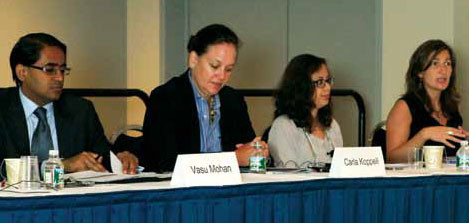
By: Erin Cox
CAPITALIZING ON THE EVOLVING political environment in the Middle East and recognizing that the opportunity for change is now, IFES Senior Research Specialist Rola Abdul-Latif and Vasu Mohan, deputy director for Europe and Asia at IFES, kicked off a Forum session on the opening opportunities for women. They were joined on the panel by USAID Senior Coordinator at the Office of Gender Equality and Women’s Empowerment Carla Koppell, and Yemeni gender specialist and activist Rana Jarhum.
Mohan began by discussing the regional changes as a chance for international organizations to evaluate their gender perspective, citing IFES’s experience. He said the most important issue is “human dignity and fundamental human rights,” concluding that equality of women and men is a gender issue, not a woman’s issue, and it “begins with us.” The IFES Status of Women in the Middle
East and North Africa (SWMENA) program conducted nationally representative surveys on women’s status in Lebanon, Morocco and Yemen between 2009 and 2010.
Abdul-Latif, who led the research portion of this project, highlighted some of the most striking data on women’s political and civic participation, and opinions toward law reforms that would improve the status of women in these countries. Abdul-Latif said majorities of both men and women in Lebanon, Morocco and Yemen support gender quotas in elected bodies. But while a majority of surveyed men and women in all three support women as political candidates, a sizeable percentage of even women believe men make better political leaders: 46 percent of women in Lebanon, 35 percent in Morocco and 85 percent in Yemen.
Speaking on a more personal level, Jarhum began her presentation with a nod to the concurrent uprisings throughout the region by citing human rights activist Bilquis Allahabi: “Saleh threatens that Yemen will turn into Somalia … we are now threatening him to turn Yemen into Tunisia.” She said what once was a small group of students refusing to leave the university in Sanaa one day, turned
into a massive political sit-in encompassing a long stretch of Sanaa that would take “30 minutes” to traverse. This “city inside a city,” Jarhum stated, is the visual representation of this fundamental change throughout Yemen, creating a chance to renegotiate the social contract. The current reality may paint a different picture than the data on women’s participation in Yemen from the SWMENA survey in December 2010.
That survey indicated 95 percent of surveyed women reported they had not participated in any civic activities including protests or demonstrations. Yet, according to Jarhum, “It is very likely the numbers would be quite different today as the country has seen significant female participation in the demonstrations.” Speaking on behalf of Yemeni women, Jarhum said women’s highest priorities include: (1) participation in political dialogue; (2) women holding at least 30 percent of seats in political bodies; and (3) equality in all aspects of life and representation in the constitution. She said the most pressing challenge facing women in Yemen in the coming months is to seize this unprecedented window of opportunity; if the “heroic role” of women is not recognized, all
efforts may be threatened.
Reminding the audience that democracy is not complete without equal representation of men and women, Koppell highlighted the importance of women gaining political power and representation internationally. She noted women invest differently when they are in positions of power and they assert different priorities in governance and push for nonviolence in conflict resolution. It is these women who will break the negative opinions of women’s capabilities mentioned by Abdul-Latif.
The loss of advances already made is a real threat in many of these reforming countries and is already occurring in Egypt. To avoid such losses and move forward, activists must “not accept the usual discourse” and challenge views many try to label as cultural norms. The discussion concluded with strong agreement that a structural base for women’s advocacy in the region is extremely important; and gaining written representation through laws, quotas, and constitutional references
will secure women’s involvement in a successful, complete democratic transition.
To view the complete article, visit page 34 of Interaction's publication here.
- A Rape Case in Tunisia puts the Legal System on Trial
- Women: Another Casualty of Egypt’s Draft Constitution
- Call for Communication to the UN Commission on the Status of Women
- Resources
- SWMENA data used in research
- IFES Releases Data on the Status of Women in Egypt and Tunisia
- SWMENA Conducts Regional Lessons Learned
- SWMENA Featured in Interaction Monday Developments
- IFES Congratulates the 2011 Nobel Peace Prize Laureates
- Public Opinion Data and Political and Legal Reform Opportunities for Women in Yemen, Morocco and Leb
- New Challenges, Opportunities for Women’s Political Participation in the Middle East
- Women Count
- Infographics Help Advocacy Efforts for Women
- MENA Protests Could Help Advance Women’s Rights
- Popular Protests Pave Way for Women’s Rights in Yemen
- Observing International Women’s Day
- IFES Releases Paper on the Use of Gender Quotas in the Arab World
- Collaborating with Visionaries to Improve the Status of Women in Morocco
- Status of Women in the Middle East and North Africa
- Lobby Training Manuals for Activists
